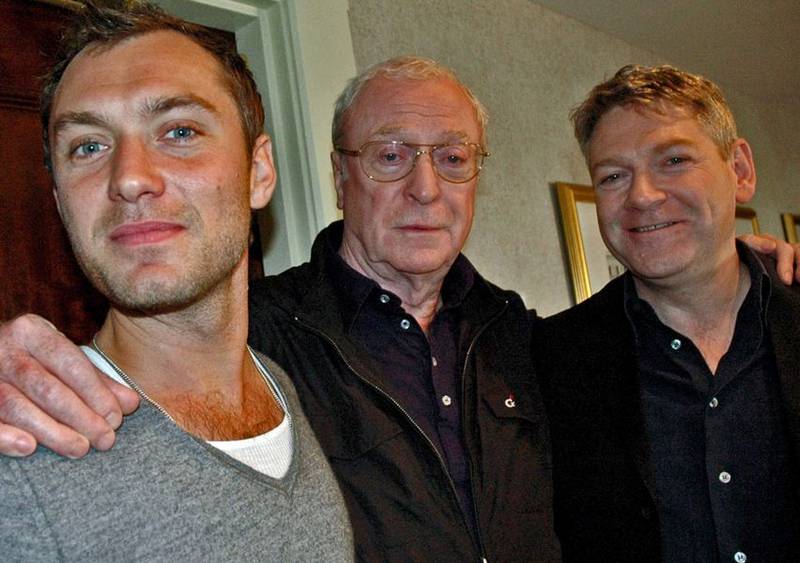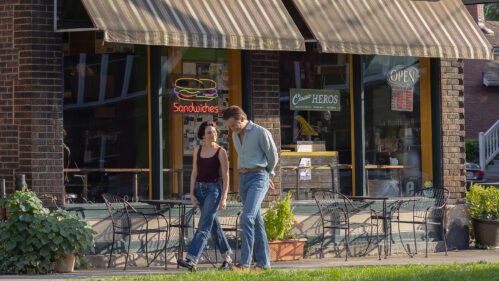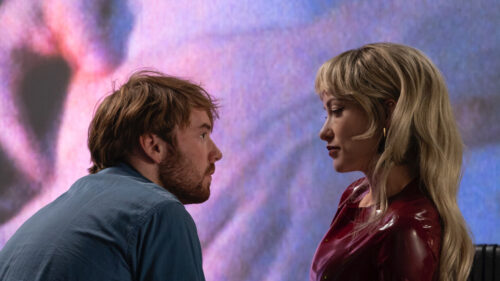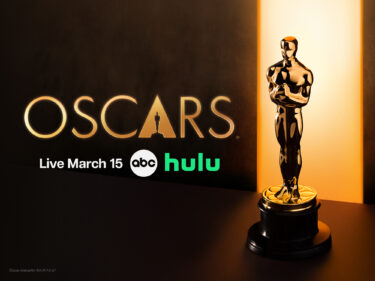TORONTO, Ont. — Everyone, including me, was under the impression that Kenneth Branagh’s new film “Sleuth” was a remake of the 1972 film. Same situation: Rich thriller writer is visited in his country house by man who is having affair with his wife. Same outcome: They argue, man is killed. Same visit: Police detective. Same so forth and so on.
But hang on, I thought, watching the film at Monday night’s Toronto Film Festival gala, I didn’t realize the screenplay was by Sir Harold Pinter. What had reduced the Nobel Prize-winning dramatist to adapting old, if good, movies? But then, in the opening moments, as the novelist (Sir Michael Caine) greets his visitor (Jude Law), there was an edgy exchange.
Novelist: “Is that your car?”
Visitor: “On the left, right.”
Novelist: “Yes, that’s my car on the right. My car is bigger than yours.”
My memory of the 1972 movie was not crystal-clear, but that dialog didn’t ring a bell. Neither did any of the other dialog. It didn’t sound like the Anthony Shaffer play, or his screenplay. It sounded– well, Pinteresque. And did the two men go through a little homosexual role-playing the first time around? The earlier movie starred Sir Laurence Olivier as the novelist (apparently you have to be knighted to play the role), and, what do you know, Michael Caine as the visitor. Even after 35 years I think I would have remembered Olivier and Caine being gay together.
Talking to Branagh, Caine and Law on Tuesday afternoon, I got the statistics: Only one line (“It’s a game!”) from the original screenplay is used in Pinter’s. Pinter did not see the movie, read the screenplay once, sat down and wrote the original situation as a screenplay by Harold Pinter. And what Branagh and his actors have made is a Pinter film, transposing the outline of the original material into an altogether quirkier, weirder, diabolical result.
In 1972 we were asked to be absorbed by the plot. In 2007 we are asked to be absorbed by the characters and how they talk and what they say. What both films share is ambiguity about the material: What do the novelist and the visitor really think about each other? What’s really going on here? With Pinter, as always, that’s really the question.
* * *
Former President Jimmy Carter is 82 years old, but Jonathan Demme’s new documentary “Jimmy Carter Man from Plains” shows him with inexhaustible energy. Demme (“The Silence of the Lambs”) watches him in public and backstage as he tours to promote his 21st book, Palestine: Peace not Apartheid. He’s up at dawn, then still appearing on the late-night shows. He’s confronting his critics. He’s talking about religion, and we even see him in a pulpit, thinking aloud about and Christians and Darwinians might just have different ways of describing the same process.
We see him on the phone with his wife Rosalyn, and find out that together or apart, they read a Bible verse every night. We see him driving nails on one of the houses being constructed by his Habitat for Humanity. He talks about the Camp David Accord that brought the hope of peace to the Middle East. He is smart, funny, informed, able to think outside the box. This is 27 years after what he calls his “enforced retirement” from the White House.
There was a story the other day about President George W. Bush’s plans for retirement, based on the new book Dead Certain by John Draper. Bush told him: “I’ll give some speeches, to replenish the ol’ coffers… I don’t know what my dad gets – it’s more than 50-75 thousand per speech… Clinton’s making a lot of money.” In another interview, he noted Clinton’s recent work with the UN, and said that after he retired “You won’t catch me hanging around the UN.”
Watching the Jimmy Carter doc, I reflected that everyone should choose the retirement plan that is right for them.
* * *
Woody Allen’s new film, “Cassandra’s Dream,” is, like his “Match Point,” set in England and deals with murder. It also has certain similarities with his “Crimes and Misdemeanors.” But it’s different on one way – the nature of the ending.
The movie co-stars Colin Farrell and Ewan McGregor as needy brothers whose uncle (Tom Wilkinson) tells them “family is family” and ask them to commit a murder for him. The movie shows them debating this proposition with Allen’s usual dialog of literary and wit, and there are situations of awkward social irony.
But here’s the strange thing. The ending, I thought, was too realistic–just the sort of thing that really could happen. In this movie, at that moment, I thought a little more artifice might have been appropriate. Not that the previous 103 minutes don’t work, because they do, but—well, sometimes it’s okay, even desirable, to have an ending of contrivance and manipulation.
Five other big Toronto films are opening theaters on Friday, so my reviews will appear then. They are David Cronenberg’s “Eastern Promises,” Julie Taymor’s “Across the Universe,” Paul Haggis’s “In the Valley of Elah,” Francois Girard‘s “Silk,” and Neil Jordan’s “The Brave One.”












